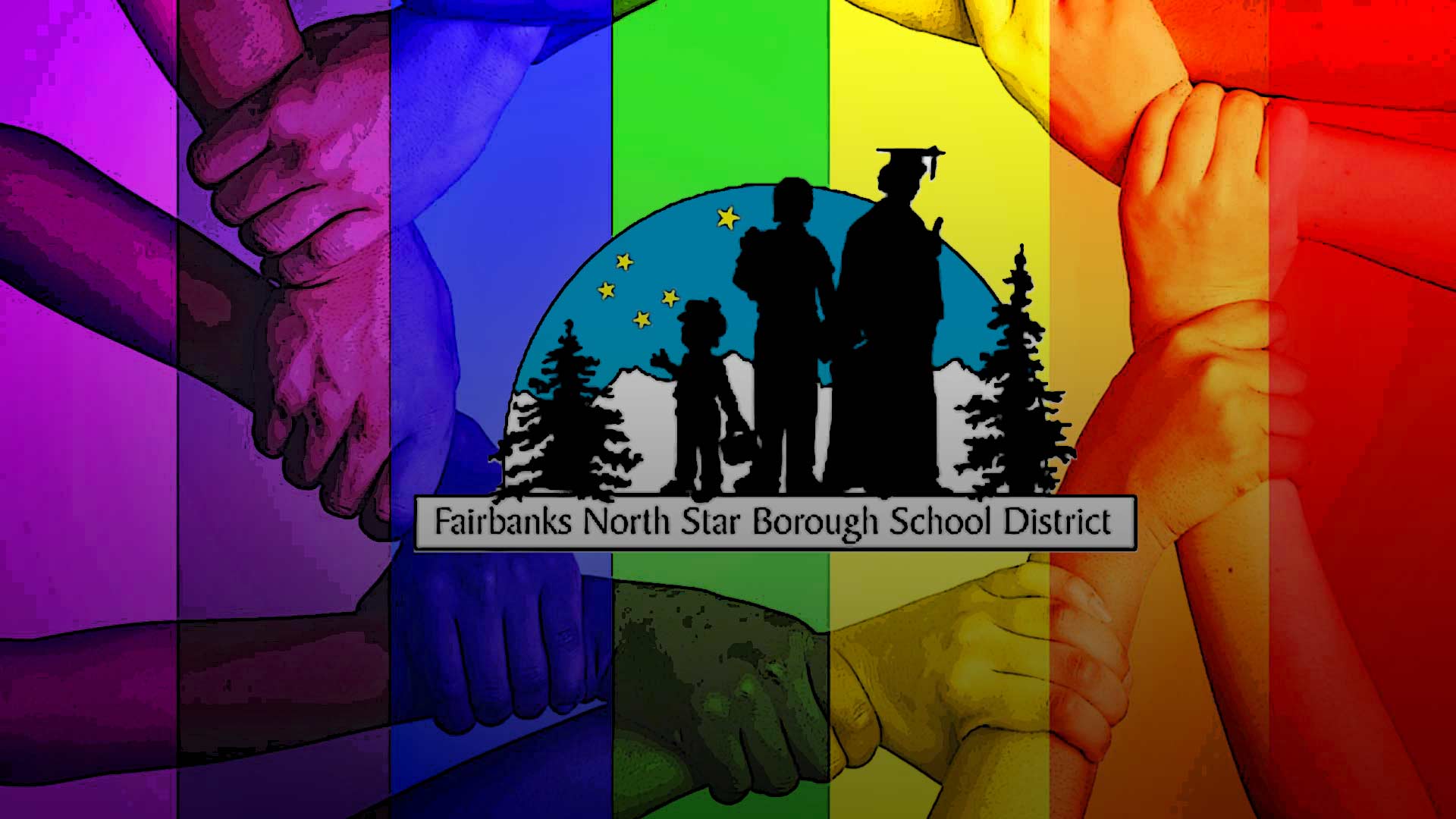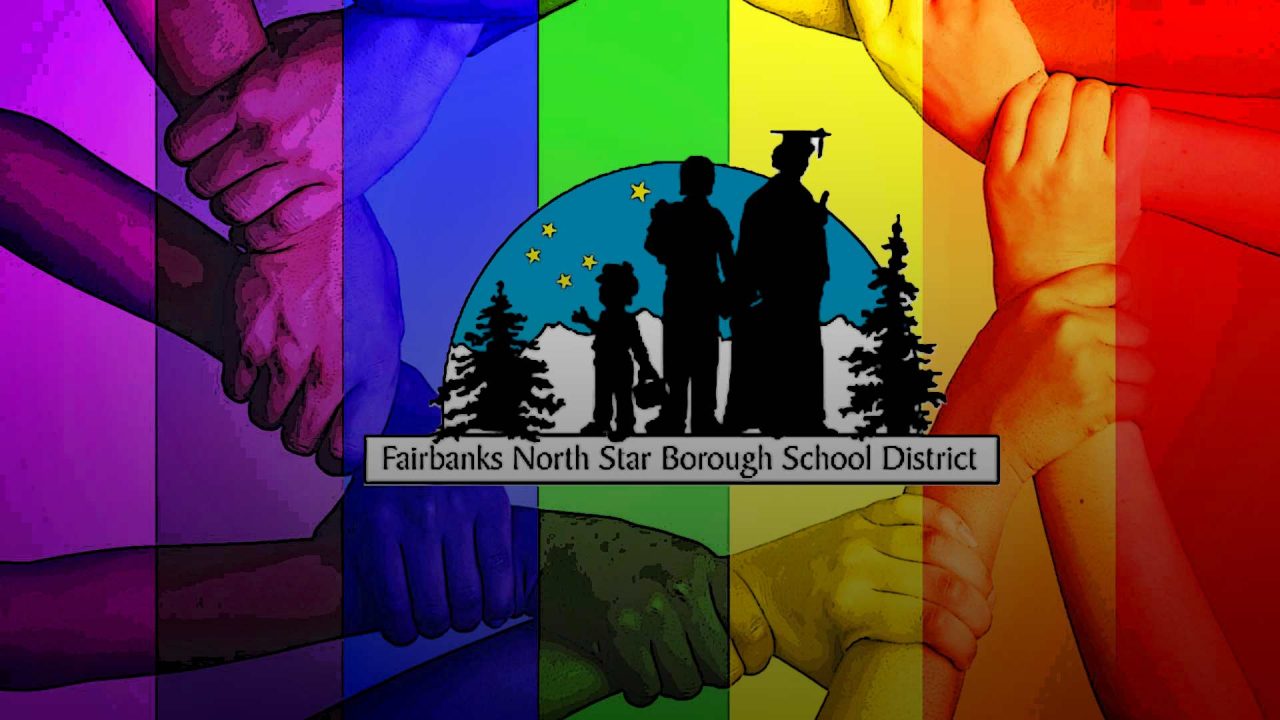
A newly constituted version of the Fairbanks School Board’s Diversity Committee met earlier this month to explore ways of ramping up so-called “diversity, equity and inclusion” (DEI) initiatives across the school district.
The unelected committee members serve as key advisors to the school board by submitting resolutions and recommendations for its approval.
At the Sept. 6 meeting, roughly a dozen committee members discussed the pros and cons of making DEI trainings mandatory for all staff and teachers. Most agreed that forcing people to undergo DEI training could lead to community backlash.
“If you’re going to make training mandatory, you better have a sound basis for it,” one committee member noted. “When you start crossing that line from talking about equality of opportunity to talking about equity, you are going into a different territory … Right now, it is so controversial that it is even being said that DEI training is unconstitutional, so we better be really careful with the recommendations that we make and make sure we are on solid ground with the training we provide.”
She called mandatory DEI training a “dangerous” idea.
The ultimate goal is to help the school board implement DEI ideology into all aspects of the school district’s culture.
“To say that you are going to have to spend taxpayer dollars to do training, you are going to get in trouble,” the member added. “I don’t recommend it.”
Controversy surrounding DEI consists in the fact that is a direct offshoot of critical race theory, the social philosophy that blames implicit and unconscious bias for so-called “structural racism” that DEI apologists say is responsible for “inequitable” outcomes across various racial and gender groups.
Most DEI programs focus on rewriting the country’s history and raising up a new generation of partisan activists who focus on a narrow set of issues dealing with race, sexuality and gender identity.
While acknowledging that DEI is a difficult sell in some circles, the Diversity Committee was intent on finding ways to advance the dogma without upsetting the Fairbanks community.
To begin, the committee aims to focus on less divisive topics, such as addressing issues associated with disabilities, but they also want to have a voice over who gets hired to serve as principals across the district because – as one committee member noted – these positions have a “huge” impact on how well schools implement DEI philosophy.
“We love the dancing and the drumming, and it’s part of our culture here in Fairbanks and Alaska, right?” she said. “How are we going to expose people to the more difficult topics? What about the transgender community?”
Fairbanks School Board Diversity Committee member
At one point, the committee discussed the need to systematically inject DEI ideology across multiple platforms such as classroom curriculum, school events, voluntary staff training, hiring practices and school assemblies. The ultimate goal is to help the school board implement DEI ideology into all aspects of the school district’s culture.
Once the Diversity Committee is better established, members plan to branch out and promote the social agenda associated with the LGBTQ community.
At one point, committee members discussed strategies for how to “expose” students and staff to certain identity groups.
Member April Scott proposed starting off by highlighting Alaska Native Dancers.
While no one disagreed with the idea, one member noted that promoting Native Dancers was fairly easy and non-controversial in Fairbanks.
“We love the dancing and the drumming, and it’s part of our culture here in Fairbanks and Alaska, right?” she said. “How are we going to expose people to the more difficult topics? What about the transgender community, because I tell you what, I can’t think of anything we could do, exposure wise, that would not put us under fire. So, we can expose some, but then we’re going to shadow others. That’s my biggest struggle.”
ALASKA WATCHMAN DIRECT TO YOUR INBOX
Scott fully agreed with the sentiment, but cautioned the group against coming out of the gate with an openly transgender agenda.
“We’re not there yet,” she said. “What you’re talking about is where we want to be when we are successful.”
Scott reiterated the need to initially focus on disabilities and Alaska Natives. That way the Diversity Committee could establish itself for the more challenging topics in the future.
“If we worry about every single thing all at the same time, we won’t make any progress. So, let’s take a first step,” she said. “We start with those small exposures, because, again, we’re developing really a parameter or a way that we do this – kind of a vehicle for it – so that way we can say, ‘Hey, that’s what we’re doing because we’ve developed a process.”
The Diversity Committee meets again in on Oct. 4, when it will further clarify its recommendations for the school board.
TAKING ACTION
— Click here to apply to serve on the Diversity Committee.
— Click here to find out how to attend a Diversity Committee meeting.








17 Comments
We’re not there yet,” she said. “What you’re talking about is where we want to be when we are successful.”
Successful means, when we’ve groomed your kids. Little Sally don’t you feel like a boy, little Johnny don’t you want to wear this dress and be Drag Queen, Sickening.
Once the Diversity Committee is better established, members plan to branch out and promote the social agenda associated with the LGBTQ community.
More Sick Diversity LGBTQ
.
This says it all: The ultimate goal is to help the school board implement [diversity, equity and inclusion] DEI ideology into all aspects of the school district’s culture. Scott fully agreed with the sentiment, but cautioned the group against coming out of the gate with an openly transgender agenda. “We’re not there yet,” she said. “What you’re talking about is where we want to be when we are successful.”
If no one pushes back on this, then it becomes the school boards’ ideology to indoctrinate your kids on such matters. Silence is taken as consent. Regulary express your opinions to your school boards on what you want them to teach to your kids. It ain’t just about reading, writing, math, or science, and history anymore. Don’t let the less than 10% rule the 90% by keeping silent.
Remove your children from the snake pit and either educate them yourself or put them in a private school you can trust. Really, it is that straightforward.
Diversity is the enemy, it’s sick what they’re trying to push onto these kids. That’s why I send my kids to a all white Christian school. No gays, atheists, Jews, blacks, or other “minorities” to force their agendas on my kids.
Weird that you would admit to such vile beliefs
Hmmmmmm. My wife said you were being sarcastic.
Diversity means anti-white racism. Equity means communism. Inclusion means incompetence. Thats the facts.
Critical Race Theory, the root philosophy behind all of this, is designed to cause division, NOT bring about unity by overcoming differences. This country has been built upon the principles of offering opportunities to anyone who wishes to step up and take them. Diversity, by original definition, “the existence of differences” is a fact: people are different. But, focusing on those differences instead of the things we have in common only develops into a finger pointing blame game. In the world of CRT, there are only two categories to put people into: oppressors or victims. No one wants to lay claim to being an oppressor, so everyone is encouraged to find a way to claim “victimhood” in the name of equity. Notice the sly substitution of the word equity for equality. They are not the same. Equity is value produced by something or someone (in this case) for the benefit of someone else. Equality, a constitutionally protected right under the law, serves to keep the door of opportunity to all who wish to enter.
Critical race theory is not what you think it is. CRT is an analytical framework to interpret the history of race in America and NOT “designed to cause division” as you falsely claimed. Contrary to the claims made here and on other sites, CRT is NOT being taught in K-12 schools in Fairbanks. Also, you used the wrong definition of equity. In this context, equity is defined as fairness and impartiality. You used the definition of equity in the context of banking and finances. Two completely different concepts that share the same word.
This all started when someone said LGBT was good, some folks trying to normalize perversion. You cant normalize perversion. You cant. But here we are, they convinced our officials who don’t have a backbone.
Imagine being so fascist that you are against schools teaching children to be accepting and respectful of different kinds of people like Natives, people with disabilities, and people with different family structures!
Stay away from kids, and quit trying to pretend that your choice should be viewed by the rest of us as somehow or another akin to those who are what they are through circumstances they weren’t allowed to choose. There’s no equivalence.
What choice are you referring to? People don’t choose to be lgb or t. If sexuality was a choice then by default that makes everyone bisexual! Sally, when did you choose to stop acting on your sexual attraction to women?
Diversity means anti-white racism. Equity means communism. Inclusion means incompetence. Get woke.
Excuse my ignorance, but aren’t schools and school boards, suppose to educate our children in basic education. You know, the old fashion reading writing and arithmetic curriculum, with a dose of history, and science. So, why the heck is the school board involved in even having this discussion at all? It’s beyond the scope of their authority, and job descriptions. Issues such as morality, diversity, and every other beliefs are the responsibilities of the parents, and the parents alone. These issues may be vented at the college level by hopefully a more mature audience, but NOT at 1 thru 12. Respect is earned and taught at home. We focus on controversial, philosophical, and adult social issues while Alaska school kids are failing with a unbelievably low national standards rating on their basic education, in reading, writing and math; need I say more. We need to eject school board members that fail to understand what their job is………..to ensure a basic education!
More Queers! I can hardly wait to see!!
Trying to get people to notice them without them noticing that they are being noticed.